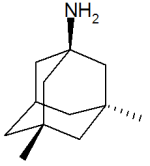A drug already sold in Europe hampers the relentless assault of late-stage Alzheimer's disease, a new study reveals. The finding suggests that the drug, called memantine, could help patients previously considered untreatable.
"This is really the first drug that seems to have had salutary effects in the more advanced cases of Alzheimer's disease," says Neil S. Buckholtz, a neuroscientist who heads the Dementia and Aging Branch of the National Institute on Aging in Bethesda, Md.
Although the drug has been used in Germany against dementias since the 1980s, its effectiveness had never been definitively demonstrated in a study of Alzheimer's patients. The first evidence that memantine might slow late-stage Alzheimer's disease came in 1999 from a preliminary report by scientists in Latvia, says Barry Reisberg of New York University School of Medicine.
To corroborate that finding, Reisberg and his colleagues identified 181 people with advanced Alzheimer's disease who lived at home with a caregiver and who retained some capacity to speak, dress themselves, and handle other daily chores. The researchers then gave memantine pills to 97 of the patients and an inert substance to 84 others.
After 28 weeks, the scientists found that the group getting the drug was faring significantly better than the other patients according to four of seven standard measurements of mental function. The tests gauge a person's ability to dress, bathe, use the toilet, and participate in other common activities. The findings appear in the April 3 New England Journal of Medicine.
Information supplied by caregivers indicated that the drug-treated patients also required, on average, 46 hours less assistance per month than the other patients did.
Memantine is made by Merz Pharmaceuticals in Frankfurt, Germany. The company is now testing the drug in people showing early signs of Alzheimer's disease, Reisberg says. If memantine proves effective against mild dementia, doctors might prescribe it with other drugs that are now given in early phases of the disease.
Like memantine, none of these other drugs reverses Alzheimer's symptoms. But they slow mental deterioration by blocking the breakdown of the brain chemical acetylcholine. Memantine should be "complimentary or even synergistic" with these drugs, Reisberg says. That's because memantine, rather than affecting acetylcholine, inhibits the action of glutamate, a brain chemical that runs amok in Alzheimer's patients.
Normally, glutamate binds to docking sites on neurons to initiate a signal. Overstimulation of the binding sites in Alzheimer's patients kills neurons. This cell death contributes to the memory lapses and confusion seen in the patients. By occupying docking sites on the neurons, memantine prevents glutamate from binding and overstimulating the cells.
The new data, some of which were reported at a meeting last year, convinced the European Union to add late-stage Alzheimer's disease to memantine's approved uses. Merz has since asked the U.S. Food and Drug Administration for similar approval.
COPYRIGHT 2003 Science Service, Inc.
COPYRIGHT 2003 Gale Group



